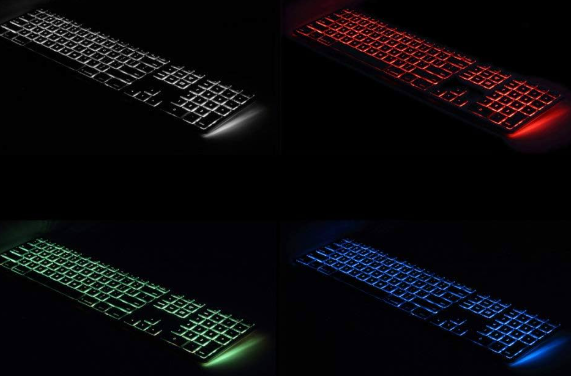Keyboards are an essential part of any computing experience, but not all keyboards are created equal. Whether you're gaming, typing, or casually browsing, the type of keyboard you use can drastically affect your comfort, speed, and accuracy. There are many variations out there, but most keyboards fall into one of four main types—each designed with different users and tasks in mind.
In this article, we'll break down the four types of keyboards, explain what makes each one unique, and help you decide which is best for your needs.

1. Mechanical Keyboards
Overview:
Mechanical keyboards are known for their tactile feedback, durability, and distinctive clicking sound. Each key uses an individual mechanical switch underneath, which provides a satisfying press and registers more accurately than most other types.
Key Features:
-
Switches: Use physical mechanical switches (like Cherry MX, Gateron, or Razer switches).
-
Tactile Feedback: Often includes a noticeable bump or audible click.
-
Durability: Lasts for tens of millions of keystrokes—great for heavy use.
-
Customization: Highly customizable with different switch types, keycaps, and layouts.
Best For:
-
Gamers who want precise control and fast response times.
-
Writers and coders who value comfort and key feedback.
-
Tech enthusiasts who love building or modding their gear.
Downsides:
-
Usually more expensive.
-
Louder than other keyboard types (unless using silent switches).
2. Membrane Keyboards
Overview:
Membrane keyboards use a soft, rubber-like dome beneath the keys that collapses when pressed. They are usually quieter and cheaper but don't offer the same tactile feel or longevity as mechanical ones.
Key Features:
-
Technology: Keys rest on pressure-sensitive rubber membranes.
-
Quiet Typing: Much quieter than mechanical keyboards.
-
Affordable: Typically low-cost and widely available.
Best For:
-
Casual users who need a basic keyboard for everyday typing.
-
Offices or shared environments where noise is a concern.
-
Budget-conscious shoppers.
Downsides:
-
Less durable—membranes wear out over time.
-
Softer feel can lead to typing fatigue.
-
Less precise than mechanical keyboards.
3. Scissor-Switch Keyboards
Overview:
Scissor-switch keyboards are a middle ground between membrane and mechanical. Commonly found in laptops, these use a special mechanism that creates a shorter travel distance and more stability than traditional membrane keyboards.
Key Features:
-
Mechanism: Uses a scissor-like structure to support the key and activate the membrane.
-
Low Profile: Slim and lightweight.
-
Short Travel: Keys don’t need to be pressed far, which can increase typing speed.
Best For:
-
Laptop users who want a consistent typing experience.
-
People looking for compact, low-profile external keyboards.
-
Office or travel setups where space-saving is important.
Downsides:
-
Harder to repair or replace individual keys.
-
Less customizable than mechanical keyboards.
-
Still wears down faster than mechanical options.
4. Ergonomic Keyboards
Overview:
Ergonomic keyboards are designed with comfort and health in mind. They come in various shapes and layouts that aim to reduce wrist strain, improve posture, and prevent repetitive strain injuries (RSIs).
Key Features:
-
Design: Split or curved key layouts that match the natural position of your hands.
-
Palm Rests: Many come with built-in wrist or palm supports.
-
Typing Comfort: Promotes a neutral wrist and arm position.
Best For:
-
Professionals who type for long hours.
-
Users with wrist pain, carpal tunnel, or repetitive strain injuries.
-
Anyone looking to improve posture and reduce typing fatigue.
Downsides:
-
Steeper learning curve due to the unconventional layout.
-
Often more expensive.
-
Not ideal for gaming or fast-paced typing tasks.
Which Keyboard Is Right for You?
Here’s a quick comparison to help you decide:
| Type | Best For | Pros | Cons |
|---|---|---|---|
| Mechanical | Gamers, Writers | Durable, tactile, customizable | Loud, pricey |
| Membrane | Casual Users | Quiet, cheap, simple | Short lifespan, mushy feel |
| Scissor-Switch | Laptop Users, Travelers | Compact, faster than membrane | Limited lifespan, low customization |
| Ergonomic | Office Workers, Long Typists | Health-focused, comfortable | Expensive, takes adjustment |
Choosing the right keyboard depends on your typing habits, usage needs, and personal comfort. Whether you're a gamer, a writer, or just someone who types casually, there's a keyboard type tailored for your style. Test a few out if you can—your hands will thank you!
